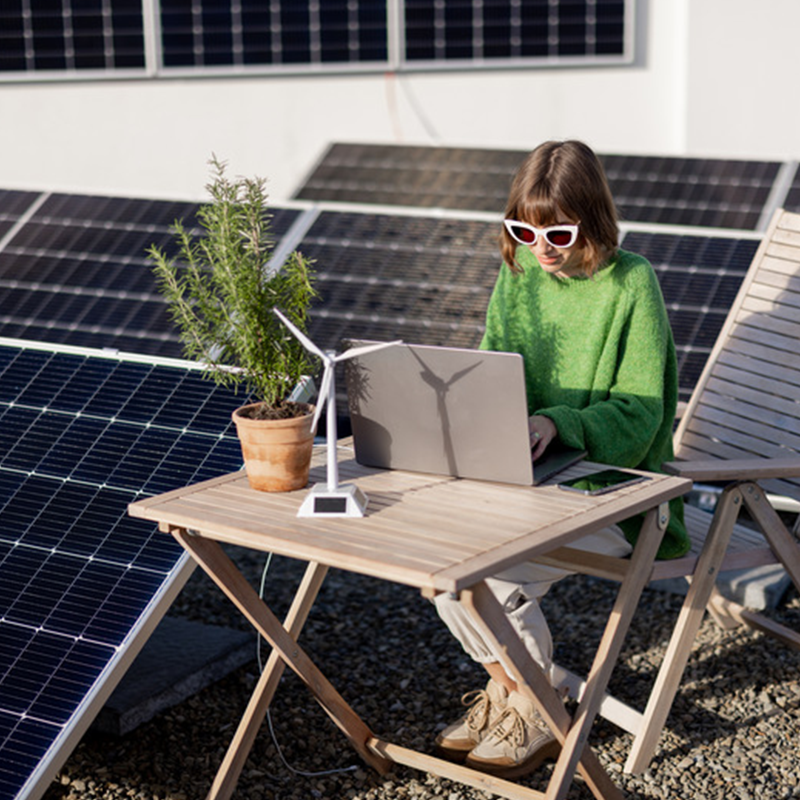Green Technology

Key Takeaway:
The goal to keep global warming at less than 1.5 degrees Celsius above pre-industrial levels seems increasingly out of reach. Still, green tech is gaining momentum given its proven ability to cut costs, increase efficiency and innovate with multiple use cases in materialized and dematerialized solutions.
Trend Type: Technology
Sub-trends: Green Tech, Sustainable Technology, Bio-based Matrials, Tech Climate Commitment, Eco banking, Regenerative AgTech, Product Longevity
Use Cases
SUSTAINABLE TECHNOLOGY: Apple uses robots for recycling. Taz is a machine that uses new shredder-like technology to separate magnets from audio modules and recover more rare earth elements. The company also recently expanded the capabilities of its patented iPhone disassembly robot Daisy to take apart 23 models of iPhone, and has offered to license those patents to other companies and researchers free of charge. Daisy can disassemble up to 1.2 million phones each year, helping Apple recover more valuable materials for recycling. The company has offered to license the patents related to Daisy for researchers and other electronics manufacturers developing their own disassembly processes. An additional robot, Dave, disassembles Taptic Engines, helping to recover valuable rare earth magnets, tungsten, and
BIO-BASED MATERIALS: Notpla provides seaweed-based food packaging and an edible bubble for containing liquids. It has raised nearly $20M in equity funding to date and secured a grant from Innovate UK (the UK government’s innovation agency) in partnership with UK beverage company Lucozade Ribena Suntory.
ECO-BANKING: Twig, a UK-based fintech company, has launched a mobile banking app that allows users to cash out on their used items instantly. Unlike other resale apps, Twig aims to be a full-fledged financial platform (not a retail site) that contributes to the circular economy. This free fintech app is easy to use and boasts a refreshingly simple UX design. All users have to do is upload photos of their “pre-loved” items, which are immediately analyzed by Twig’s machine learning algorithms and given a price tag. If users are pleased with the offer, they can cash out instantly, receiving a payment for their goods before any shipment is required.
ECO-BANKING: The ‘FLIT Invest’ app is an investment platform for those looking to align their values with their investments without having to worry about sacrificing on returns. The app works by enabling users to get started by ranking their values related to clean water, climate solutions and green energy before being paired with a personalized portfolio. The automated investment app also covers social and welfare issues with options like the Affordable Healthcare investment theme and the Military Weapon industry exclusion. These aspects provide investors with a guilt-free investment experience that will also enable them to track their impact according to their specific investments and goals.
REGENERATIVE AGTECH: Outdoor clothing brand Patagonia aims to use 100% regenerative cotton and hemp by 2030 and helped launch the Regenerative Organic Certified program to encourage these practices. The company debuted the first products from its regenerative cotton crop initiative in spring 2022 — a program that now includes 2,200 farmers.
PRODUCT LONGEVITY: Nike is taking a high-tech approach. In its London store in late 2022, the brand piloted its Bot Initiated Longevity Lab, known as BILL, a “robot-augmented system” that can repair and clean customers’ sneakers. The in-store robot identifies areas of wear and tear during a 3D scan, which can then be repaired with a patch of the shopper’s choice.
PRODUCT LONGEVITY: Apple rolled out its self-repair service in Europe. The service, which first launched in the United States earlier in 2022, gives iPhone 12 and 13 and some MacBook owners access to repair manuals plus more than 200 individual parts and tools to fix their own devices.
BIO-BASED MATERIALS: SeaCell a biodegradable and compostable seaweed-based fabric The range of brands using SeaCell demonstrates the versatility of the material — examples include CALIDA (lifestyle), WYLD1 (activewear), Speidel (lingerie), and Fair Trade Cashmere (knits). Similarly, Keel Labs (formerly AlgiKnit) produces seaweed-based fibers to be an alternative to nylon and polyesters. It has raised $17M in total funding, including a $13M Series A round that drew participation from fast fashion retailer H&M.